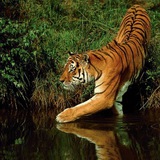
Telegram-канал wildlifen - Wildlife
 20792
20792
Join us as we explore the wilderness and share the beautiful scenery of nature! For all questions: @magellanvs

 20792
20792
Join us as we explore the wilderness and share the beautiful scenery of nature! For all questions: @magellanvs

Adelie Penguin protects Emperor penguin chicks from predatory petrels
Читать полностью…
The Brazza monkey Cercopithecus neglectus lives in central Africa. It is named after the French traveler Pierre Brazza.
She has a recognizable orange stripe on her forehead, and the white fur on her muzzle forms a "beard and mustache."
They are found both in dry mountain forests and in swampy areas with tall grasses. They are perfectly camouflaged among green vegetation, in case of danger they can freeze, becoming almost invisible.
Brazza monkeys live in small family groups headed by a single male. It is easy to recognize him, since the species has clearly expressed sexual dimorphism - males are almost twice as large as females.
Monkeys spend most of their time in trees, feeding on seeds, leaves, fruits and insects. Sometimes their diet includes chicks, bird eggs and small reptiles. In search of food , they can also descend to the ground

The Indian paradise flycatcher Terpsiphone paradisi is 19-22 cm long .
Sexual dimorphism is present in the plumage coloration. The plumage of the females is reddish-brown, the throat is light gray, the belly is light. Young males are very similar to females, but have a black throat and a blue eye border.
At the 2nd year of life, they grow tail feathers up to 24 cm long. From the 3rd year of life, their plumage turns white, and the two central 12 tail feathers lengthen to 30 cm.
Paradise flycatchers are common in densely forested areas from Turkestan to India, in northern and eastern China, and in the south to the Indonesian archipelago on the islands of Sumba and Alor.
Paradise flycatchers feed on insects, hunting for their prey more often in flight at an altitude of 1-2 m above the ground. They rarely look for insects in the foliage.

Animal rights activists rescued a leopard that fell into a well. The poor animal kept afloat with the last of its strength. Fortunately, an Indian farmer noticed him and called rescuers. They quickly pulled out the cat, which did not resist at all.
Now the animal is under the supervision of veterinarians. As soon as the leopard gets better, he will be released

Tawny frogmouth does not belong to owls at all, its closest relatives are nightjars. This bird lives all over Australia and on the island of Tasmania.
In length, it reaches 35-55 cm and weighs up to 700 g, and in zoos (where it suffers from obesity) - up to 1400 g. The eyes are yellow, the beak is wide, above the beak is a bunch of bristly feathers. They click loudly with their beaks and can also emit rolling, increasing cries.
These birds hunt at night, during the day they sit on logs or on tree branches closer to the trunk. The coloring is patronizing - sitting quietly and vertically, they completely merge with the tree. Sensing a threat, the smoky frog-mouth freezes, almost closing its eyes, straightening up and exposing its beak and relying on its patronizing coloration.
The smoky frogmouth is an insectivorous bird, but sometimes eats frogs or other small animals. When hunting, the beak is used more than the claws, which differs from owls, with which they are often compared

These wild cats from the Amazon rainforest have been living and breeding at Novosibirsk Zoo since the 1970s. This female, Stesha, was born on May 17, 2023, and has already become a guest favorite. She is growing up very energetic!
Video by: Sergei Iltyakov youtube.com/@user-ph1zi8kn7i
🔔 Russia Beyond

Little cougars are spotted and then the spots disappear
Читать полностью…
Any Russian language learners here?
A Russian as a foreign language teacher started a free Telegram channel /channel/learnRCRussian with Russian vocabulary, grammar tips, slang, proverbs, jokes, quizzes etc. It will be of great help for anyone learning Russian.

What a catch! He had to swim with him all the way to the shore
Читать полностью…